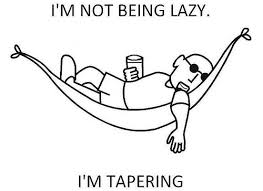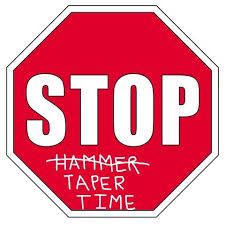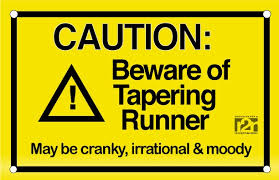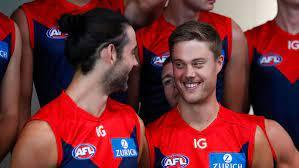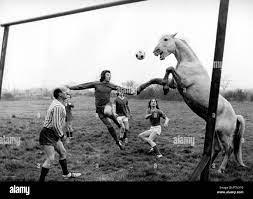
Everything posted by binman
-
2024 Injury List
With all team defensive systems and zones teams in 2024 simply can't carry a 'stay at home forward'. They haven't been able to for at least 5 years. This is an (educated) guess - but i reckon ten years ago of the 22 players in each team, perhaps as few as half of them would run more than 10kms in a game. Now EVERY player, barring injury or being subbed out, runs north of 10kms a game - including the key forwards (I'm pretty sure I'm right in saying that the key forwards cover more distance than even the key defenders). You could see the impact of basically carrying Hawkins for the first third of the season on Geelong's ability to defend. It was made worse by Cameron's injury issues and reduced running power. They simply could not defend the ground and as a result repeatedly got opened up.
-
Everyone Saying We Will Drop
Personally, if i was framing a market for the flag i'd have the pies and the lions just about equal favorites, with us just behind (in large part because we've had more players with interrupted preseasons). There is very little separating those three teams. You only need to look at the exposed form from last season in terms of head to head games between them for clear evidence of that fact (ie small margins, pretty much 50 50 for all head to head combos) That said, 9.50 is not good value at all (and 5.00 for the pies to win just simply ridiculous). Futures bets, particularly for an event seven months away, is a total sucker bet created by the bookies to siphon money from punters (not that there would much money in GF pools at this point). As Webber notes above: 'Where we finish depends on injuries/players available through the season. As it does for all clubs. It’s the single greatest determinant of success, even if the least sexy.' There is no way of knowing which teams might cop key injuries at key times (like us losing every key forward, and then melk, at the business end of the season). Or which team might just have run of really bad luck - for example imagine taking a futures bet before the 2023 season on the crows to make the finals (or even win it), only for them to miss out because of a complete howler of a video review that knocked them out. For the same reason, futures bets on say the Melbourne Cup are a scam by bookies (though at least if you had an interest in a horse that you knew was a star, and others didn't, you might get crazy good odds). The current favorite for the Melbourne Cup is Without A Fight at $15. I wouldn't take $15 for it to actually run! On Webbers comment about the impact of injuries on teams chances of success, quite frankly, it amazes me that in 2024 this is just not an accepted fact. Since the end of the last season I've taken more interest in other football codes (and to a lesser extent NBA). For example I've been following the Spurs fortunes closely in the EPL and the 49ers in the NFL. The impact of injuries (and in the EPL also players missing due to international games) is forensically analyzed - and factored into predictions of how teams might go, previews of games and reviews of games. Unlike with AFL footy, noting the impact of injuries is not reflexively dismissed as making excuses, but rather factored in as logical reasons contributing to predictions, a particular result, or run of results. My sense is that it is uniquely Australian phenomena that the impact of injury is not realistically factored into the media's analysis of footy, and hardly at all by fans. I think the footy media plays a key role as it is dominated by the voices of ex footballers, many of whom played last century ,and the ridiculous make no excuses, soldier out, soldier in palaver is baked in to the coverage and therefore also the culture of the game.
-
2024 Injury List
My guess would be his fitness is not yet at AFL level. I only went to two VFL game last year , Coburg mid season and the blues later in the season - he looked gassed late in quarters in both, particularly the Coburg game. A modified program might suggest they are focusing on building his aerobic base (the same might be true of Mcadam). I suspect Jefferson dominated at junior level as key forward who was strong, had good hands, good one on one and and read the ball well. And his lack of aerobic tank was not exposed. But the days of a key forward being able to get by just on physical strength, clunking a few marks and slotting sausage rolls are well and truly gone. Hawkins is a good example - for the first two thirds of his career his role was pretty much to stay inside 50 and play the big gorilla, wrestling role. And he was just about the best at it too. But in the last few years he dropped weight and clearly improved his tank and running ability, getting up and down the ground much more. Arguably his 2022 season was his best. But last year he had an interrupted preseason and started the season nowhere near peak aerobic fitness. Forced to go back to his stay inside 50 style, he was nowhere near as effective as he had been. The same could be said of Tmac coming back into he side late in 2023. And Jefferson ain't no Hawkins (yet?).
-
PRESEASON TRAINING: Wednesday 7th February 2024
Sounds like vfl footy coaches in the 70s.
-
PRESEASON TRAINING: Wednesday 7th February 2024
Young folk and their memes. It's a whole other language - I'm only know getting up to speed on emojis Im guessing that one means Nibbla was also showing his elite evasive skills today?
-
PRESEASON TRAINING: Wednesday 7th February 2024
That's why Taylor picked him, of that i have no doubt.
-
PRESEASON TRAINING: Wednesday 7th February 2024
Was Nibbla lacing out passes, setting up goals and making great decisions again? Good on ya nibbla!
-
PRESEASON TRAINING: Wednesday 7th February 2024
- PRESEASON TRAINING: Wednesday 7th February 2024
- PRESEASON TRAINING: Wednesday 7th February 2024
Better than if he was doing my sort of training, which would have been just the walking part above. And even then it would be more like strolling the boundary then finished up sitting under the shade of a linden tree.- 2024 Preseason Training Thread
- PRESEASON TRAINING: Monday 29th January 2024
It's me, it's Schache, I've come home now.- Forward Line & Backup Ruck Issues Going into 2024 and beyond ...
I'd be okay with: 'One of the key questions heading into 2024 is whether Melbourne can bloody kick straight to get back to flag contention? 🤔 👉'- Forward Line & Backup Ruck Issues Going into 2024 and beyond ...
Indeed. 'One of the key questions heading into 2024 is whether Melbourne can score more to get back to flag contention? 🤔 👉' As you say making finals is kinda key to winning a flag. And i'd add that that the only time we need to score more is in the Grand Final. I'll admit i had tuned out by then, but i thought the Pies won the flag. By CODE sports' logic, I must be wrong because the Lions were the second highest scoring team in the AFL last season. But i guess i see their point - over 24 rounds of home and away footy, the Pies scored a whopping 63 points more point than us (and we scored 91 points more than we did in our 2021 premiership season!). And i wonder what they have to say about the Crows who were highest scoring team in the AFL last season - and missed the finals ('One of the key questions heading into 2024 is whether the crows' opponents can score less to get back to flag contention? 🤔 👉')- PRESEASON TRAINING: Monday 29th January 2024
I went to training last wed and had similar thoughts. Petty was limping quite noticeably near the end of training and McAdam looked pretty gassed. Which as you say is understandable for petts given he is coming off that foot injury. In fact even though they never really communicated anything other than a very loose rehab time frame he is ahead of the worst case scenario that was floated (ie lisfranc requiring 10-12 months rehab) With Mcadam one thing i did notice is how skilled he was in the handball in tight area drill they did a few times. good hands and great evasive skills. Strong too, as evidenced by standing up in tackles. And i was surprised how quick he is off the mark. In the match sims he also took a couple of strong marks - very sticky hands. I think Melk's defensive (but can still provide an offensive threat), medium forward role is his if he can get his tank up to scratch by round one.- PRESEASON TRAINING: Friday 26th January, 2024
I had the same thought. Give he played almost every game, and i though was really good in the first half of the season i wonder if that points to him not always carrying out roles goody had given him?- PRESEASON TRAINING: Friday 26th January, 2024
Be still my beating heart. I went to training last Wednesday, and a highlight was may running with the flight of the ball to brilliantly spoil an ANB mark - but Nibbla kept his feet (and May did not), scooped up the lose ball, ran 10 metres and weighted a beautiful, pinpoint kick to Spargs (or Laurie?) who strolled into an open goal. Brilliant kicking and decision making skills, so no change there.- PRESEASON TRAINING: Friday 26th January, 2024
Poor pun punted- PRESEASON TRAINING: Friday 26th January, 2024
- PRESEASON TRAINING: Friday 26th January, 2024
Young male horses break tackles?- PRESEASON TRAINING: Wednesday 24th January 2024
A very good point. Most of the work rucks do is around the ground as opposed to the centre square (80%?) where relative strength is a huge factor (and height). KFW was getting pushed around at thrown in and around the ground stoppages at Casey last year. That will happen less and less, particularly because there's not that many mid twenty ruck behemoths running around in the VFL anymore with so few stand alone clubs. So he'll get more taps - and more contested marks too for that matter.- PRESEASON TRAINING: Wednesday 24th January 2024
A very good point. And there's perhaps no better example than the best ruck i have seen play - Maxy.- PRESEASON TRAINING: Wednesday 24th January 2024
Yep, that's my sense too. And i also wonder if Schcahe is one of those athletes that finds hard to put muscle on as even with nearly 10 years in the AFL system his arms are still a bit noodly.- PRESEASON TRAINING: Wednesday 24th January 2024
I concur. Both have bulked up considerably - particularly KFW. I think it's harder to assess young rucks in training situations, particularly on a day when there weren't any ruck drills. But Verell certainly looked the more natural footballer, which of course is not surprising given their backgrounds. But KFW had one big advantage over Verell - he is taller. And he will get bigger still too. Verell will too of course but nowhere as big (ie in terms of height and muscle) as KFW who will be a monster if he stays in the AFL system. A year at Casey will give us a clear idea if KFW will make it I think. On a semi related note, Schache was standing only 25 metres away from me at one point. He was next to Max and there wasn't much between them height or size wise. It made me wonder why they haven't tried him as a second ruck option - perhaps they have and it wasn't his go?- 2024 Preseason Training Thread
Happy to have other clubs on for something to watch, but i hate dees games on Thursday night - particularly ones in Melbourne (because I'll almost always go). Friday night games are so much better. Still stand alone, the week is done so after a win you can waych the replay. And you get the benefit of the footy shows on radio on sat morning all discussing the game. - PRESEASON TRAINING: Wednesday 7th February 2024
Account
Navigation
Search
Configure browser push notifications
Chrome (Android)
- Tap the lock icon next to the address bar.
- Tap Permissions → Notifications.
- Adjust your preference.
Chrome (Desktop)
- Click the padlock icon in the address bar.
- Select Site settings.
- Find Notifications and adjust your preference.
Safari (iOS 16.4+)
- Ensure the site is installed via Add to Home Screen.
- Open Settings App → Notifications.
- Find your app name and adjust your preference.
Safari (macOS)
- Go to Safari → Preferences.
- Click the Websites tab.
- Select Notifications in the sidebar.
- Find this website and adjust your preference.
Edge (Android)
- Tap the lock icon next to the address bar.
- Tap Permissions.
- Find Notifications and adjust your preference.
Edge (Desktop)
- Click the padlock icon in the address bar.
- Click Permissions for this site.
- Find Notifications and adjust your preference.
Firefox (Android)
- Go to Settings → Site permissions.
- Tap Notifications.
- Find this site in the list and adjust your preference.
Firefox (Desktop)
- Open Firefox Settings.
- Search for Notifications.
- Find this site in the list and adjust your preference.






